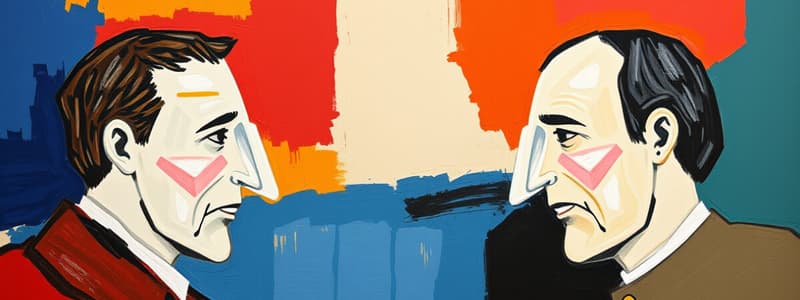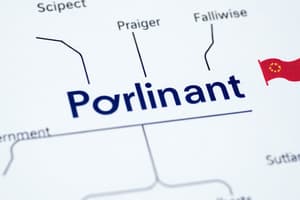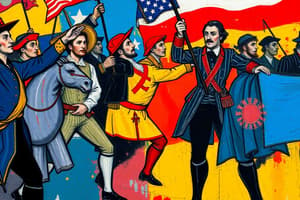Podcast
Questions and Answers
Who were the Federalists?
Who were the Federalists?
- Those who wanted to keep the Articles of Confederation
- Those who opposed the Constitution
- Those who supported the ratification of the Constitution (correct)
- Those who wanted a monarchy
What did Antifederalists oppose?
What did Antifederalists oppose?
- The Articles of Confederation
- The ratification of the Constitution (correct)
- The Bill of Rights (correct)
- All of the above
What is the Magna Carta?
What is the Magna Carta?
A charter forced upon King John of England by his barons that limited the power of the monarchy.
What did the Petition of Rights limit?
What did the Petition of Rights limit?
What is the English Bill of Rights?
What is the English Bill of Rights?
What type of government did a Royal Colony have?
What type of government did a Royal Colony have?
What is a Proprietary Colony?
What is a Proprietary Colony?
What characterizes a Charter Colony?
What characterizes a Charter Colony?
What were the Articles of Confederation?
What were the Articles of Confederation?
What is the idea of Representative Government?
What is the idea of Representative Government?
What is Limited Government?
What is Limited Government?
What is Ordered Government?
What is Ordered Government?
What is the Separation of Powers?
What is the Separation of Powers?
What is a Boycott?
What is a Boycott?
What was called for in the Virginia Plan?
What was called for in the Virginia Plan?
What did the New Jersey Plan propose?
What did the New Jersey Plan propose?
What was the Connecticut Compromise?
What was the Connecticut Compromise?
What was the Commerce and Slave Trade Compromise?
What was the Commerce and Slave Trade Compromise?
What was the Three Fifths Compromise?
What was the Three Fifths Compromise?
What is Bicameral?
What is Bicameral?
What is Unicameral?
What is Unicameral?
What does the term Repeal mean?
What does the term Repeal mean?
What does Ratification refer to?
What does Ratification refer to?
What is a Charter?
What is a Charter?
What did Ben Franklin think about the Constitution after its finalization?
What did Ben Franklin think about the Constitution after its finalization?
What do we know about the 1st inauguration?
What do we know about the 1st inauguration?
What was the main reason for the Annapolis and Philadelphia Convention?
What was the main reason for the Annapolis and Philadelphia Convention?
What influenced the framers?
What influenced the framers?
What type of government was under the Articles of Confederation?
What type of government was under the Articles of Confederation?
What type of government was formed under the new Constitution?
What type of government was formed under the new Constitution?
What were some achievements of the 2nd Continental Congress?
What were some achievements of the 2nd Continental Congress?
What is the Constitution?
What is the Constitution?
What state representation proposals were there?
What state representation proposals were there?
What were the trade regulation proposals?
What were the trade regulation proposals?
What does Quorum mean?
What does Quorum mean?
What were the royal colonies?
What were the royal colonies?
What were the Proprietary colonies?
What were the Proprietary colonies?
What were the Charter colonies?
What were the Charter colonies?
What features did State Constitutions and the Articles of Confederation have in common?
What features did State Constitutions and the Articles of Confederation have in common?
What colony was founded on personal and religious freedom?
What colony was founded on personal and religious freedom?
What colony has the oldest Constitution?
What colony has the oldest Constitution?
What were reasons for the national government's failure after the Revolutionary War?
What were reasons for the national government's failure after the Revolutionary War?
When did Parliament limit the power of the crown?
When did Parliament limit the power of the crown?
What was the main reason for writing the Federalist papers?
What was the main reason for writing the Federalist papers?
What was the main influence on framers during this time?
What was the main influence on framers during this time?
What were the similarities between the 1st and 2nd Continental Congress?
What were the similarities between the 1st and 2nd Continental Congress?
How was Washington elected?
How was Washington elected?
What was the first national government?
What was the first national government?
How many states did it take to ratify the new Constitution?
How many states did it take to ratify the new Constitution?
Who was the author of the Albany Plan?
Who was the author of the Albany Plan?
What are the three English political ideas that shaped the government?
What are the three English political ideas that shaped the government?
What was the date that the Constitution was signed and where?
What was the date that the Constitution was signed and where?
What are the three branches of government?
What are the three branches of government?
What does the legislative branch do?
What does the legislative branch do?
What does the executive branch do?
What does the executive branch do?
What does the judicial branch do?
What does the judicial branch do?
What are some weaknesses of the Articles of Confederation?
What are some weaknesses of the Articles of Confederation?
What are two strengths of the Articles of Confederation?
What are two strengths of the Articles of Confederation?
How many years after the ratification did the Bill of Rights get added?
How many years after the ratification did the Bill of Rights get added?
Where did most of our ideas for government come from?
Where did most of our ideas for government come from?
What was the main issue with the Virginia, New Jersey, and Connecticut Plan?
What was the main issue with the Virginia, New Jersey, and Connecticut Plan?
What led to the idea of the Declaration of Independence?
What led to the idea of the Declaration of Independence?
How were the colonies ruled up to the mid-1700s?
How were the colonies ruled up to the mid-1700s?
What were the plans within the Constitutional Convention?
What were the plans within the Constitutional Convention?
What is the preamble?
What is the preamble?
What is the paragraph from the Declaration of Independence?
What is the paragraph from the Declaration of Independence?
Due process refers to the protection against the arbitrary taking of __________.
Due process refers to the protection against the arbitrary taking of __________.
What is a confederation?
What is a confederation?
What is a delegate?
What is a delegate?
What is popular sovereignty?
What is popular sovereignty?
Who were the framers?
Who were the framers?
Flashcards are hidden until you start studying
Study Notes
Key Political Terms
- Federalist: Advocated for the Constitution's ratification, believing the Articles were weak; notable supporters include Madison and Washington.
- Antifederalist: Opposed the Constitution's ratification, fearing excessive central government power and the absence of a Bill of Rights; prominent figures include Sam Adams.
- Magna Carta: Landmark document limiting monarchic power in England, ensuring trial by jury and due process for nobility.
- Petition of Rights: Document restricting the king's power over imprisonment and military rule in peacetime; established law enforcement principles.
- English Bill of Rights: Framework preventing monarch abuse of power; influenced American governmental structure.
Colonial Structures
- Royal Colony: Governed directly by the king with a bicameral legislature.
- Proprietary Colony: Unicameral governance assigned by the king to land grantees.
- Charter Colony: Self-governed with legislatively appointed judges; required royal approval for governors.
Government Foundations
- Articles of Confederation: First U.S. constitution, effective from 1781 to 1789.
- Representative Government: The concept where the government reflects the people's will, developed over centuries in England.
Principles of Government
- Limited Government: Restricts the government's powers; all individuals retain immutable rights.
- Ordered Government: Establishes organized regulations amongst citizens.
- Separation of Powers: A fundamental principle allocating government authority among three branches: executive, legislative, and judicial.
Compromises and Plans
- Virginia Plan: Proposed a bicameral legislature based on state populations and tax contributions.
- New Jersey Plan: Suggested a unicameral legislature with equal state representation.
- Connecticut Compromise: Established a bicameral Congress with equal state representation in the Senate and population-based representation in the House.
- Three Fifths Compromise: Determined representation by counting each slave as three-fifths of a person.
Constitutional Developments
- Ratification: Required formal approval from nine states to adopt the new Constitution.
- Bill of Rights: Added two years post-ratification to safeguard individual liberties.
Notable Historical Events
- First Inauguration: Occurred on April 30, 1789, in NYC; George Washington unanimously elected as the first president.
- Constitution Signing: Took place on September 17, 1787, in Philadelphia.
- Continental Congress Achievements: Represented the initial government, empowering Congress to raise an army.
Colonial Principles and Influences
- Popular Sovereignty: Government's legitimacy arises from the consent of the governed.
- State Representation Proposals: Included essential frameworks from the New Jersey and Virginia Plans.
- Trade Regulation Proposals: Important agreements like the Commerce and Slave Trade Compromise emerged during the Constitutional discussions.
Government Structure changes
- Weaknesses of the Articles of Confederation: Lacked a strong central authority; issues included state taxation, no executive branch, and unregulated interstate trade.
- Strengths of the Articles: Allowed Congress to declare war and resolve state disputes.
Influential Concepts
- Framers: Delegates at the Philadelphia Convention who shaped the Constitution.
- Quorum: Defined as the majority needed to conduct official business.
- Bill of Rights Addition: Reflective of the demand for enhanced individual rights amidst fears of federal overreach.
Miscellaneous
- Charter: Document granting authority similar to a constitution.
- Due Process: Safeguards against arbitrary deprivation of life, liberty, or property.
- Delegate: Representatives designated to act on behalf of their states.
Studying That Suits You
Use AI to generate personalized quizzes and flashcards to suit your learning preferences.




